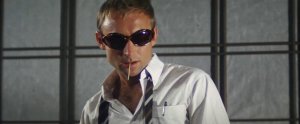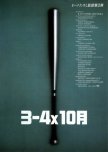a master stealing home between two out-of-the-park home runs.
What Boiling Point may lack in contemplativeness, playing the material not for action or thrills but with comedy so dark and deadpan that its intent can be easily lost on many. Tranquillity explodes into violence, which recedes to its original serenity. A tale unfolding sedately against a backdrop of calm sunny stillness punctuated by shocking moments of unpalatable violence that points to the behind-the-scenes mundanity of the perceived glamour of organised crime in Japan as presented in yakuza films. As his first scripted effort, that narrative almost dissolves into abstractions and digressions, but Kitano largely stays the course with a compellingly warped look at the uniquely Japanese culture of violence. Kitano himself turns up very late in the film's runtime, his presence as welcomed as ever, leading both protagonists and viewers alike on a guided tour of the bleaker recesses of the human psyche with the lack of a musical score heightening the tone and storytelling power behind his magnificent direction. Boiling Point may not be as refined as Kitano's later works, but it more than establishes Kitano as an artist with a clear vision and distinctive style.
Was this review helpful to you?







